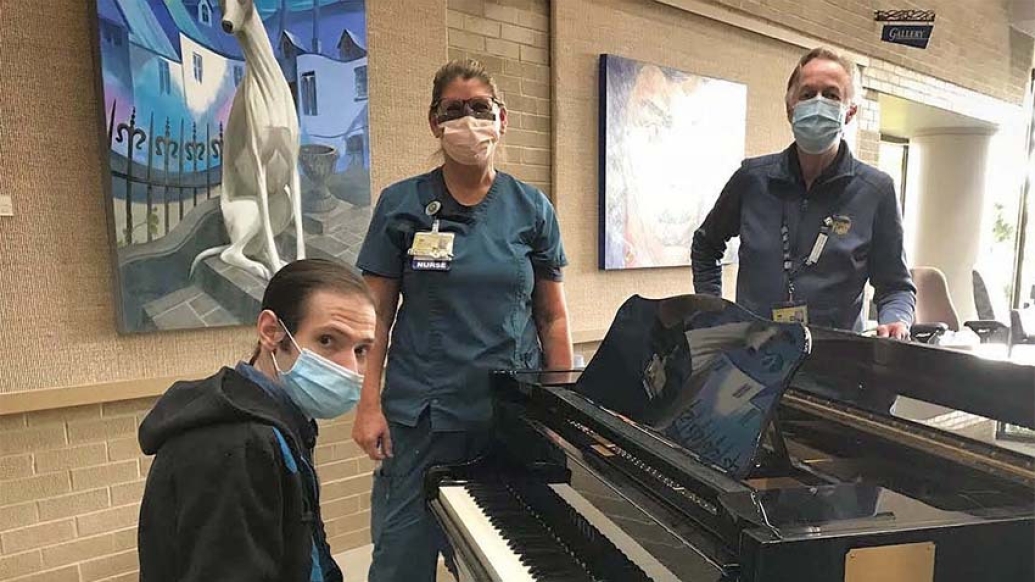Faculty, staff came together to grant one final wish for man with cystic fibrosis.
5:00 AM
Author |

Through a life filled with both joys and challenges, David Labelle defied many of the limits set by Cystic Fibrosis.
CF is a genetic disease that primarily affects the lungs, but also the pancreas, liver, kidneys and intestines. It often leads to a number of health complications and, for some patients, lowers their life expectancy.
That was the case with Labelle, who passed away last month at the age of 36. But thanks to the commitment of faculty and staff at Michigan Medicine, his death came shortly after the fulfillment of one of his final wishes.
A grand goal
At age 17, Labelle was rushed to C.S. Mott Children's Hospital due to a bleeding ulcer. During his treatment and recovery, Labelle saw the beautiful grand piano in the Michigan Medicine lobby. As a kid who loved listening to and playing a variety of instruments, Labelle dreamed of playing that piano one day.
"Music helped him survive and live through his many challenges," said Deb Crawford, nurse on 6C at Michigan Medicine, who cared for Labelle during his many hospital inpatient stays.
The opportunity finally came almost eight years, and a few life-changing events, later.
'I learned so much from him'
Besides his stay at Mott nearly two decades ago, Labelle had received most of his care at Case Western Reserve Medical Center in Cleveland. However, in 2017, he had another medical emergency that brought him back to Michigan Medicine.
At that point, he transferred his full-time care to Michigan Medicine, becoming a frequent patient on 6C.
There, Labelle's mother learned about the Gifts of Art bedside music program and found Gregory Maxwell, a music practitioner, to help her son cope with his pain and time away from family.
One of the first and most comprehensive arts in medicine programs nationwide, Gifts of Art brings the world of art and music to hospitalized patients. The program utilizes the arts to offer support and reduce stress for patients and their families.
"Even though I was there to support David during his time as an inpatient, I learned so much from him," said Maxwell. "David was an incredible musician. Usually, I play the instrument for the patient. David was the first person who played with me."
Like Podcasts? Add the Michigan Medicine News Break on iTunes or anywhere you listen to podcasts.
Both of them not only shared the same taste in rock and folk rock music, but they also both played the guitar, which Labelle learned from his father.
Making connections
During his many inpatient stays at U-M, Labelle connected with many other members of his care team, including social worker Brian Nickerson.
In the summer of 2019, due to complications from CF, Labelle and his care team were not sure he would see the end of the summer. Yet, his goal to play that grand piano in the U-M Lobby remained vibrant.
Knowing that time was precious, Maxwell, Nickerson and Labelle's family worked hard to get the permissions and authorization needed for Labelle to safely play in the lobby. Fortunately, Labelle fully recovered and was discharged from the hospital before receiving that permission and having the opportunity to play.
Then in January 2020, Labelle found himself back in the hospital. But he found faith, continued love for music and the support of his family and friends and once again recovered.
After several more health complications, Labelle returned to Michigan Medicine, where his prognosis grew more dire.
Gifts of Art worked with nursing, hospital operations and the Infection Prevention staff so that Labelle finally got a chance to play the piano he had admired for almost 20 years. It was a moment to be remembered, as faculty and staff worked hard to ensure the safety of all amid the COVID-19 pandemic.
"David was a deeply resilient person," said Nickerson. "He was so happy to play that piano."
For others, Labelle's story exemplifies the caring and dedication to the patient experience that has never been lost at U-M, no matter the circumstances.
"While we have many precautions and procedures in place to help keep our patients and families safe, I am glad this team recognized the value of what mattered most to David, and were able to work together with David in fulfilling his wish," said Molly Dwyer-White, director of patient experience. "It shows how much Michigan Medicine values patients and their experiences, and how enriching programs like Gifts of Art and others can connect us to other important aspects of healing."
MORE FROM MICHIGAN: Sign up for our weekly newsletter
Labelle, David's mother, expressed her gratitude for the teams of people who cared for her son.
"When you have a child with a long-term chronic illness, you form bonds with the caregiving team," says Labelle.
She fondly remembered a physical therapist that brought regular pancakes that David had been craving, the nurse who cried with her in the hallway during a particularly difficult moment when they thought David would not make it, and the music practitioners, like Greg Maxwell, who drove in to the emergency department on New Year's Eve, to play for David during his last few hours.

Explore a variety of health care news & stories by visiting the Health Lab home page for more articles.

Department of Communication at Michigan Medicine
Want top health & research news weekly? Sign up for Health Lab’s newsletters today!





